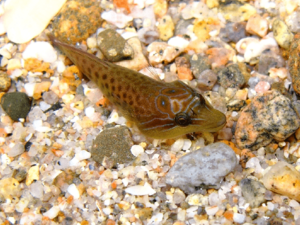Shore clingfish facts for kids
Quick facts for kids Shore clingfish |
|
|---|---|
 |
|
| Conservation status | |
| Scientific classification |
|
| Kingdom: | Animalia |
| Phylum: | Chordata |
| Class: | Actinopterygii |
| Order: | Gobiesociformes |
| Family: | Gobiesocidae |
| Genus: | Lepadogaster |
| Species: |
L. lepadogaster
|
| Binomial name | |
| Lepadogaster lepadogaster (Bonnaterre, 1788)
|
|
| Script error: The function "autoWithCaption" does not exist. | |
| Synonyms | |
|
|
Script error: No such module "Check for conflicting parameters".
The shore clingfish (Lepadogaster lepadogaster) is a small, interesting fish. It belongs to a group of fish called clingfish. These fish are known for their special ability to stick to rocks! You can find the shore clingfish in the Mediterranean Sea and parts of the Atlantic Ocean, especially near Galicia, Spain.
Contents
Where Shore Clingfish Live
This fish lives in the eastern Atlantic Ocean. You can find it from Galicia, Spain, all the way down to the Mediterranean Sea. It prefers warmer waters, generally between 43.8 degrees North and 30 degrees North latitude.
How Shore Clingfish Live
Shore clingfish often live among smooth rocks and large pebbles underwater. They are quite small, growing up to about 6.5 centimeters (2.5 inches) long.
What Does Cryptobenthic Mean?
The shore clingfish is known as a cryptobenthic fish. This means it's very good at hiding. It uses both its behavior and its looks to blend in with its surroundings. This term usually describes adult fish that are around 5 centimeters (2 inches) long.
How They Cling to Rocks
The shore clingfish gets its name because it can attach itself strongly to ocean rocks. It does this using its special pelvic fins. These fins have changed over time to form powerful suckers. These suckers help the fish stick tightly to rocky surfaces, even when waves are crashing. Its front fins are also very strong, which helps it hold on even better.
Staying Safe from Predators
The clingfish has other cool features that help it live on rocky shores and avoid being eaten. For example, it has a triangular-shaped head and a flat body. These shapes help the fish reduce the push and pull of water from waves. This makes it easier for them to stay in place.
Active Lifestyle
The shore clingfish is more active than some other types of clingfish, like L. purpurea. It swims faster and eats more often.
What They Eat
Shore clingfish mostly eat detritus. This means they feed on dead organic material found in their environment. It's like they're cleaning up the ocean floor!
How Scientists Classify Them
Lepadogaster lepadogaster is one of three types of Lepadogaster fish found in the Northeast Atlantic. Scientists sometimes change how they classify fish as they learn more. For example, L. purpurea was once thought to be the same as Lepadogaster zebrina. But now, L. purpurea is considered its own species, and L. zebrina is actually the same as L. lepadogaster. It's all about understanding their family tree!
 | Charles R. Drew |
 | Benjamin Banneker |
 | Jane C. Wright |
 | Roger Arliner Young |


